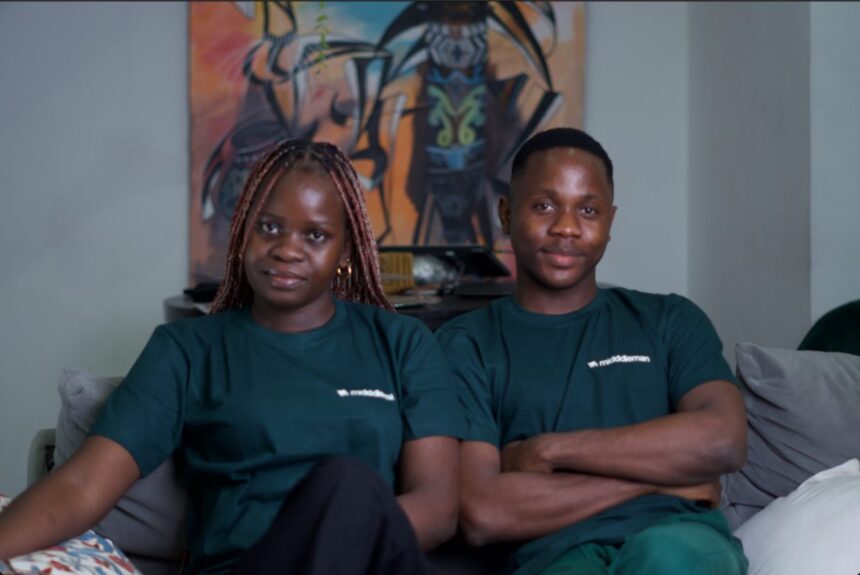For years, African small and medium enterprises (SMEs) have relied on retail platforms such as AliExpress, and Temu to source low-cost goods from China. That gap has created an opportunity for Midddleman, a Nigerian tradetech startup to link African businesses directly with manufacturers in China.
Midddleman’s story began with two young graduates, Omolara Sanni and Adeola Owosho, who launched a string of micro-businesses selling everything from skincare products to car accessories on Instagram. But what they learned had nothing to do with product margins. It was about trust.
“People did not trust us enough to pay before delivery,” Sanni recalls. “We were in Lagos, but customers outside Lagos would refuse to pick up their items. Some would stop responding entirely. We lost money sending goods out.”
The inability to scale due to buyer mistrust pushed them to think more deeply about Nigeria’s e-commerce challenges.
What You Should Know
By 2023, they attempted to fix the trust problem by launching an escrow platform, also called Midddleman. It worked technically, as it would hold the buyer’s money until delivery, but the market was unconvinced.
“People didn’t trust vendors,” Sanni says, “but they also didn’t trust Midddleman to hold their money. We needed brand equity, something we couldn’t afford to build.”
The failure turned out to be a blessing. While the escrow feature struggled to gain traction, a bigger, more urgent problem became impossible to ignore.
Around 2020, Nigerian Naira cards became unreliable for dollar payments. Importers were stranded. Sanni and Owosho, who were still importing small items were forced to switch to 1688, a Chinese wholesale marketplace cheaper than Temu or AliExpress. They paid using yuan via their Alipay wallets.
It turned out almost every SME around them was facing the same crisis. This pain point triggered the pivot that changed everything.
The founders say Midddleman transformed into a dedicated payment and procurement platform for African businesses importing from China.
Serving Businesses, Not Shoppers
According to the founders, the pivot shifted Midddleman away from the retail crowd and into the world of serious importers who required:
- Direct access to manufacturers, not retail sellers
- Navigation support for 1688’s Mandarin-only interface
- Quality checks at the factory floor
- Pricing negotiation for bulk orders
- Consolidation of purchases from multiple suppliers
- Seamless yuan payments
- Logistics support from China to Nigeria
On all these fronts, platforms like Temu and AliExpress simply cannot compete.
“Temu is for buying five shirts or personal items,” Sanni says. “Businesses can’t turn a profit buying from Temu. They need factories. They need customisation. They need quality assurance.”
Midddleman’s Real Differentiator
Midddleman’s most powerful advantage is its team of procurement agents based in China.
For many African importers, the fear of receiving poor-quality goods or entirely wrong items is real. These agents solve that.
“Our agents go into the factories, check the goods, inspect the materials, and confirm that what you ordered is what you’re getting,” Sanni explains.
They also negotiate bulk pricing, consolidate items, repackage goods to reduce shipping costs, and verify product authenticity. Sanni said the impact is tangible. Sanni also pushes back against the common belief that Chinese products are inherently low quality.
One of the biggest barriers for African importers is language. 1688.com, the main wholesale marketplace for Chinese factories is almost entirely in Mandarin.
Midddleman replaced the chaos with an AI sourcing assistant.
- Users paste a 1688 link
- The system translates the entire page to English
- Prices are automatically shown in Naira
- Users can ask an AI bot detailed questions, including shipping costs and product specifications
The feature has become so essential that customers now purchase AI credits just to use it.
What This Means
Although Africa is its strongest market today, Midddleman says its ambitions are global.
Nigeria–China bilateral trade reached $22.6 billion in 2023, with an estimated 80–90% of Nigeria’s imports from China consisting of manufactured goods.
It is into this high-volume trade corridor that Midddleman is inserting itself as an infrastructure partner rather than a retail marketplace.
With rising import demand, persistent payment barriers, language limitations, counterfeit fears, and the need for reliable factory-level procurement, experts say Midddleman is positioning itself not as a retail marketplace, but as the infrastructure powering Africa–China trade at scale.
Talking Points
It is impressive that Midddleman has built a platform connecting African SMEs directly to Chinese manufacturers, addressing a long-standing challenge: unreliable access to factory-level suppliers and secure cross-border payments.
This feature alone positions Midddleman as a practical solution for businesses that require bulk orders, customised products, and quality assurance, capabilities that retail platforms like AliExpress or Temu cannot provide.
At Techparley, we see how Midddleman’s on-ground procurement agents and AI-powered translation tools can accelerate trade efficiency, helping African importers bypass language barriers, payment obstacles, and inconsistent quality.
The platform’s combination of payments, sourcing, logistics, and real-time quality inspection means SMEs can now operate with the same confidence as larger importers, reducing risk and improving profit margins.
With the right strategic support, Midddleman has the potential to become a global platform for African importers, turning a small tradetech startup into a major player in cross-border commerce.
——————-
Bookmark Techparley.com for the most insightful technology news from the African continent.
Follow us on Twitter @Techparleynews, on Facebook at Techparley Africa, on LinkedIn at Techparley Africa, or on Instagram at Techparleynews.





